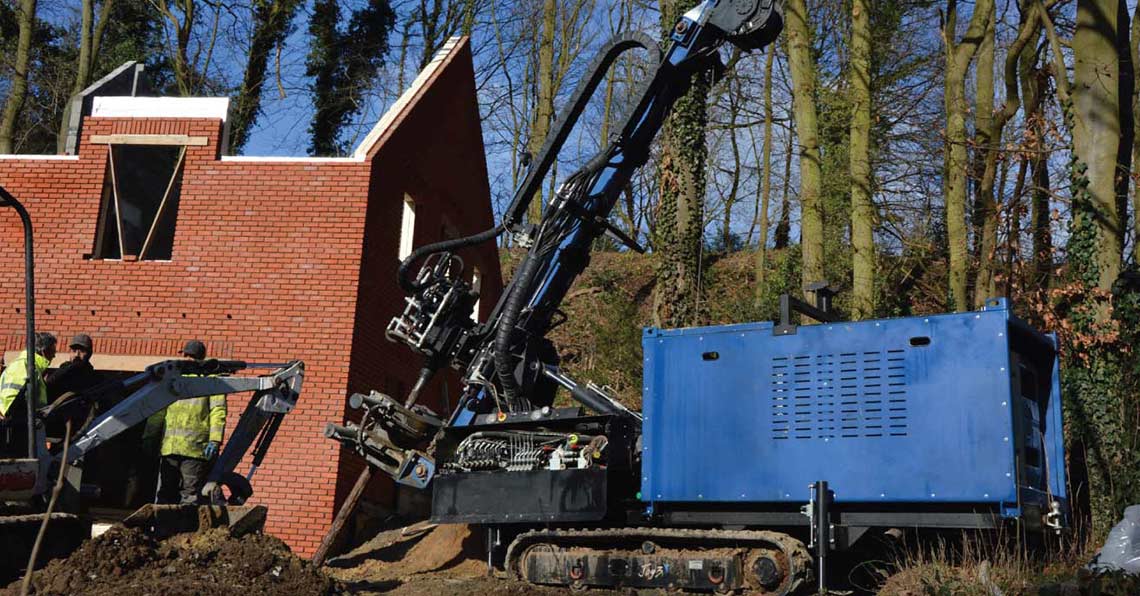
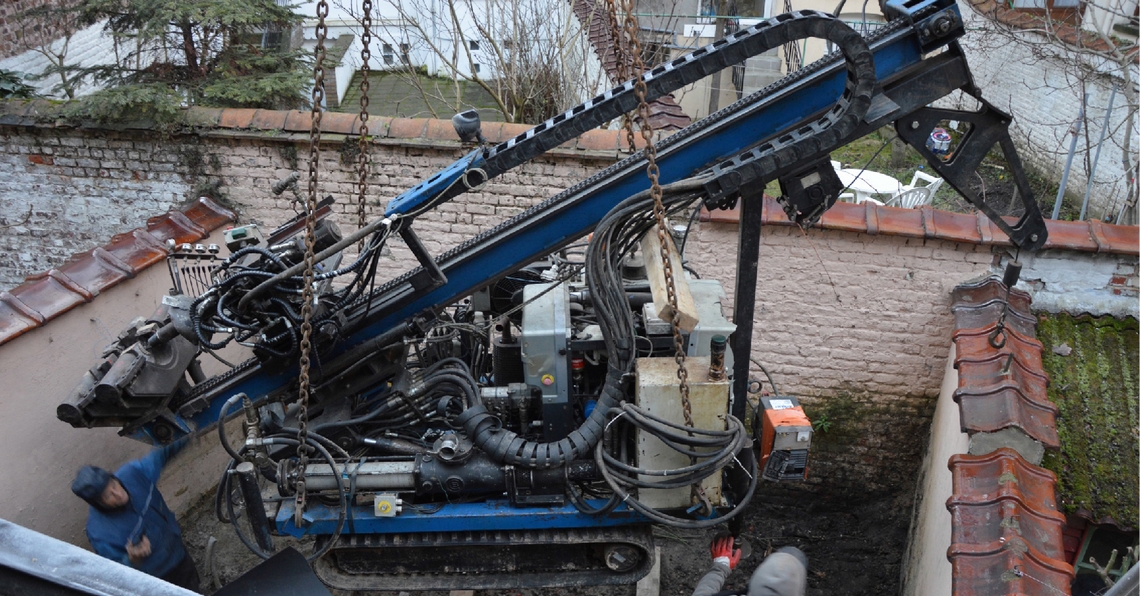
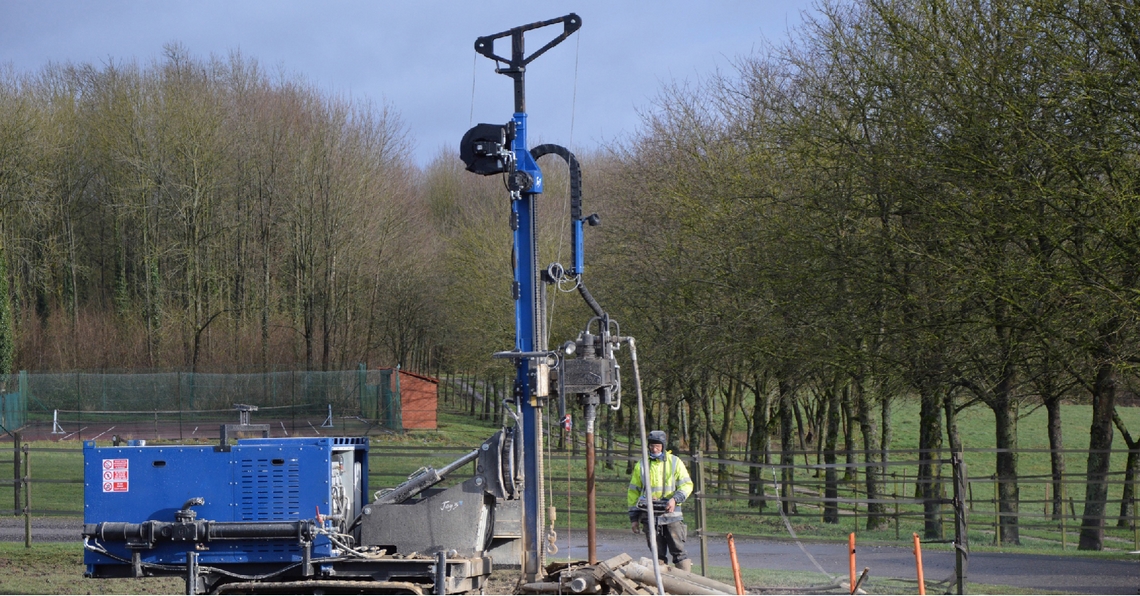
Geothermal installations for the heating and air conditioning of all buildings
Geothermal installations give you access to a renewable energy from subsoil heat. They are the ideal solution to free yourself from fossil fuels which are becoming scarcer and will cost more and more.
Not only will geothermal energy allow you to heat your building but it will also give you the opportunity to cool your buildings in summer by circulating "cold" water from the subsoil through the building's installations. That is what is called "geocooling", a source of significant savings since extra air conditioning is no longer necessary.
Choosing geothermal energy for a private home or a business,
is to start an exciting project with a number of important stages.
You know that you can rely on GEO-GREEN!
We are at your service throughout your project.
The user benefits

COST-EFFECTIVENESS
Choosing a geothermal installation is to make an investment but with the certainty that this investment will always be cost-effective.
ENVIRONMENT
Geothermal energy allows you to enjoy optimal comfort whilst protecting the environment: a clean energy source, it contributes positively to the air quality and cancels out any risk of pollution linked to extraction, processing, transport or storage.
PROPERTY
Heating and air conditioning of buildings represent a high cost in household and business budgets. With a geothermal installation, buildings have a modern and reliable infrastructure which not only allows the energy bill to be drastically reduced, but also offers real added value for any property investment.
about the benefits
Quality service
GEO-GREEN specialises in the design and installation of geothermal systems and in particular of closed loop systems. GEO-GREEN studies all aspects of your project: the most appropriate system is chosen according to the surface area to be heated or cooled and also the desired degree of comfort.
With GEO-GREEN, you will have the advantage of great technical expertise and an in-depth knowledge of geology and construction. Thus all the parameters are taken into account in order to optimise your installation and get the most from high efficiencies and geothermal performance.
You can also count on the expertise and quality service of GEO-GREEN for carrying out your soil remediation projects, emptying of tanks or construction of water wells.
Discover GEO-GREEN's services, choose yours and take advantage of a quality service.
about our services
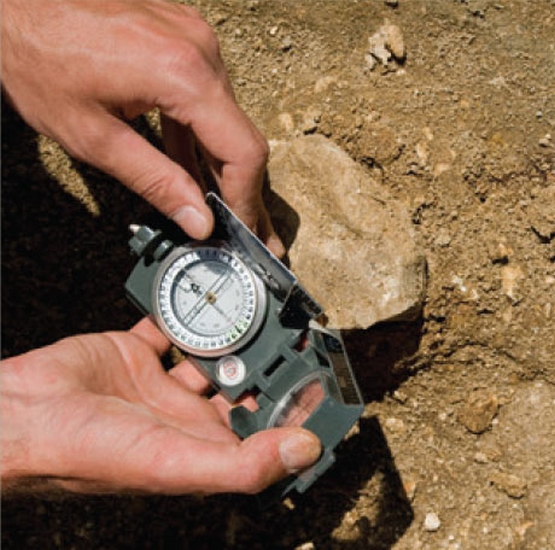
Latest news
Geo-Green contributes to the GEOWAL project to map Wallonia’s geothermal potential

Geo-Green took part in the GEOWAL project, an initiative aimed at assessing the technical and economic potential of shallow geothermal energy (less than 300 meters deep) for heating and cooling in Wallonia.
A consortium of experts serving Wallonia
The GEOWAL project is the result of a collaboration between several renowned institutions:
• Geological Survey of Belgium (GSB): Brings its expertise in geology and subsurface mapping.
• University of Liège (ULiège): Contributes academic and scientific research, especially for open-loop systems.
• VITO: The Flemish Institute for Technological Research, specialized in sustainable technologies.
• Deplasse & Associés: An engineering consultancy specialized in drilling and geothermal energy.
• Geo-Green: Provides its recognized expertise in geothermal systems, particularly closed-loop systems.
This consortium was formed in response to a request from the Walloon Region, via the Operational General Directorate for Spatial Planning, Housing, Heritage and Energy (DGO4), to carry out this strategic project.
Geo-Green’s unique contribution to the GEOWAL project
Geo-Green was invited to join the consortium due to its recognized expertise in geothermal energy in Wallonia:
• Wallonia’s most extensive TRT database
Geo-Green holds the largest database of Thermal Response Tests (TRT) in the region, offering crucial information for evaluating the thermal properties of the subsurface.
• In-depth geological expertise
As experienced geologists, we have detailed knowledge of the Walloon territory — essential for interpreting geothermal data and effectively contributing to the mapping of geothermal potential.
Goals and future outlook of the GEOWAL project
The GEOWAL project aims to:
• Map geothermal potential: Develop precise maps that estimate the amount of energy the Walloon subsurface can provide based on drilling depth and the type of geothermal system used.
• Inform and raise awareness: Provide public and private stakeholders with tools to better understand the opportunities geothermal energy offers in Wallonia.
• Promote sustainable development: Encourage the use of geothermal energy as a renewable resource, thereby contributing to the region’s energy transition.
Geo-Green is proud to have contributed to this important initiative and reaffirms its commitment to sustainable development and energy innovation in Wallonia.
What is an HP?
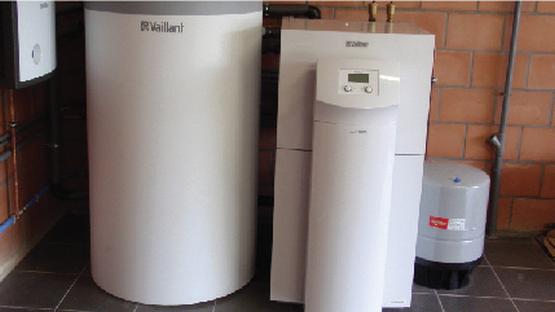
Amongst buildings which are sufficiently well insulated, there are many which can be heated with what are called "low temperature" systems. They guarantee an optimal comfort with boilers producing water at 40°C (instead of 60 to 75°C in the past). Three main types of boiler efficiently give this type of heating: oil, gas and heat pumps.
If gas and oil boilers are no longer to be advocated, heat pumps (HP) using geothermal energy are more innovative and offer a real alternative. They capture the calories from the subsoil by means of geothermal probes and transform them into calories able to heat buildings. A geothermal probe consists of drilling a hole into the ground in which one places a double tube permitting the heat transfer fluid to circulate and to become permeated with the heat from the subsoil. It is this energy which will then be used by the HPs.
HPs are ingenious and wonderful tools. Their size, depending on the requirements of the building, must be assessed by professionals.
Principle
The heat pump is a small boiler which enables the transformation of the calories received at low temperature into high temperature calories. The principle is simple: a fluid circulating in the HP is transformed into vapour on contact with the water coming from the geothermal probes. The gas obtained will be compressed by a compressor and will see its temperature increase (physical law). Once the required temperature has been reached, the gas transmits its heat to the water circulating in the radiators (or other heaters). Then the gas is expanded, which enables it to go back to its liquid state.... which once again will be transformed into vapour on contact with the geothermal liquid, and so on.....
In the case of geothermal energy, the HPs transform the calories received from the subsoil (about 12 °C) into calories needed for heating the building. This depends on the mode of transmission of heat to the building, either underfloor heating, or wall heating, or fan convector heating. In general, the temperature given out by HPs is around 30 to 65 °C, which allows both buildings to be heated and the production of domestic hot water.
Performance
The performance of an HP is what one calls PF. This is measured following a standard procedure. Geothermal HPs (ground - water) have a PF between 4 and 5. This indicates that for 1 kW electric energy injected into the pump (to operate the compressor), it returns between 4 and 5 kW. That is, 3 to 4 kW gained at no cost ... thanks to geothermal probes!
By way of comparison, air source HPs have a much lower PF: between 2.5 and 3. This means that these HPs will consume much more electricity.
HP manufacturers
If in the past, HPs were produced by specialist manufacturers, today the market has become sufficiently large (due particularly to Germany) that all the major brands produce very good quality, high performing and reliable HPs. Vaillant, Viessmann, Buderus, Stiebel Eltron, SDEEC, Geotherma etc. Some even give a 10 year warranty, which shows the state of development of the tool!
